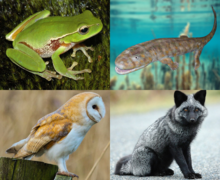Stegocephali
Ancient amphibians
Stegocephali is a group containing all four-limbed vertebrates.
| Stegocephali | |
|---|---|

| |
| Examples of stegocephalians (clockwise from top left): Litoria phyllochroa, Acanthostega gunnari, Vulpes vulpes, and Tyto alba | |
| Scientific classification | |
| Domain: | Eukaryota |
| Kingdom: | Animalia |
| Phylum: | Chordata |
| Clade: | Elpistostegalia |
| Clade: | Stegocephali Cope, 1868 |
| Subgroups | |
|
See text. | |
The word was first used in 1868 by the American paleontologist Edward Drinker Cope, who used it as a general category of prehistoric amphibians. This did not get used by other people.
In 1998 the Canadian paleontologist Michel Laurin used the word and gave a formal phylogenetic definition. This was intended to include taxa with digits rather than fins, except where secondarily lost.[1]
References
change- ↑ Michel Laurin (1998): The importance of global parsimony and historical bias in understanding tetrapod evolution. Part I-systematics, middle ear evolution, and jaw suspension. Annales des Sciences Naturelles, Zoologie, Paris, 13e Series 19: pp 1–42.